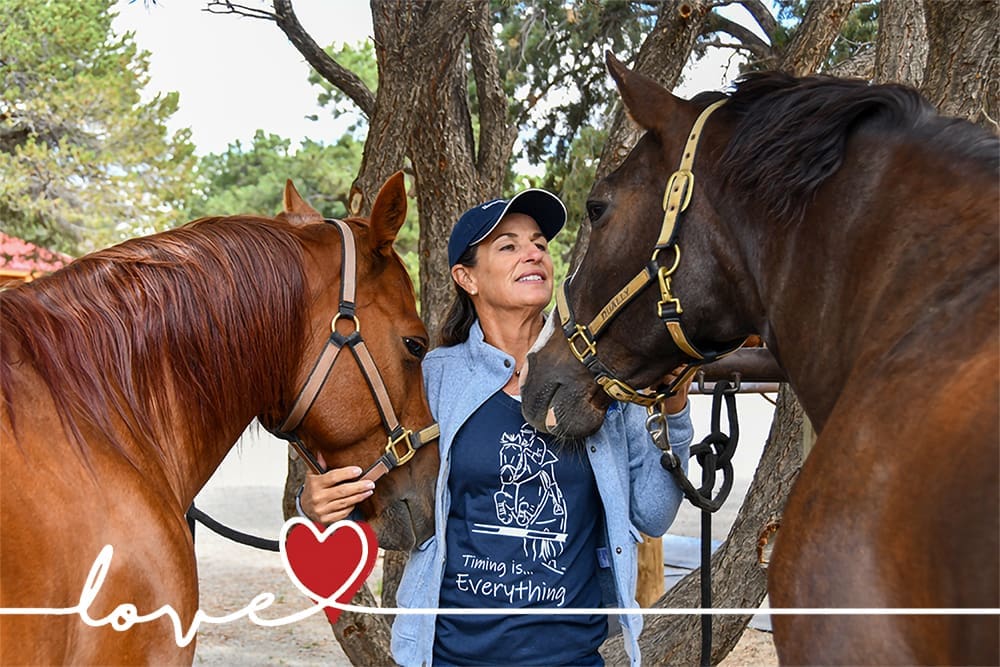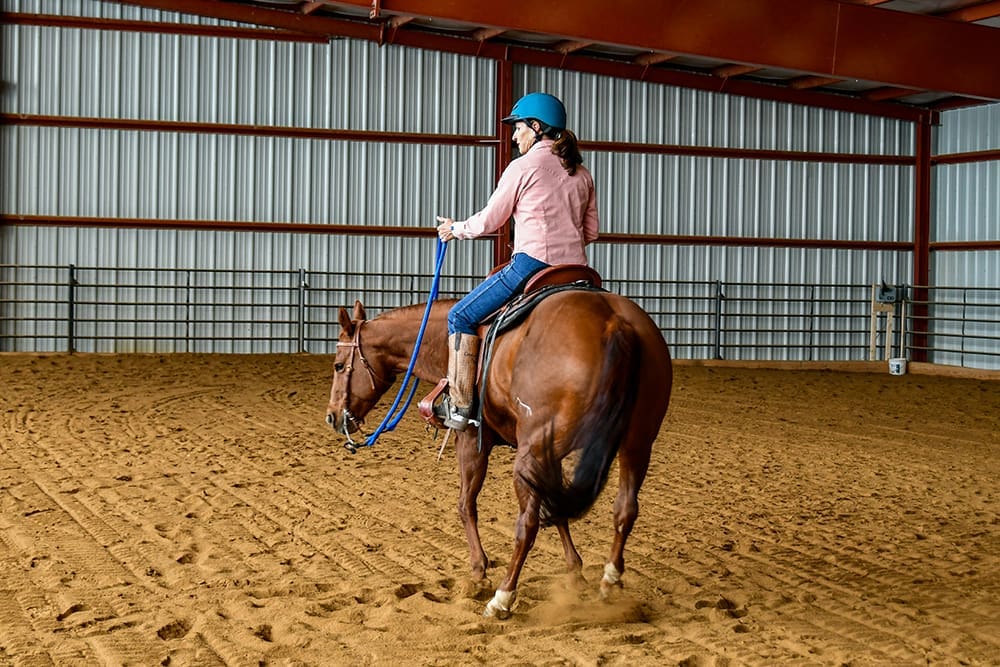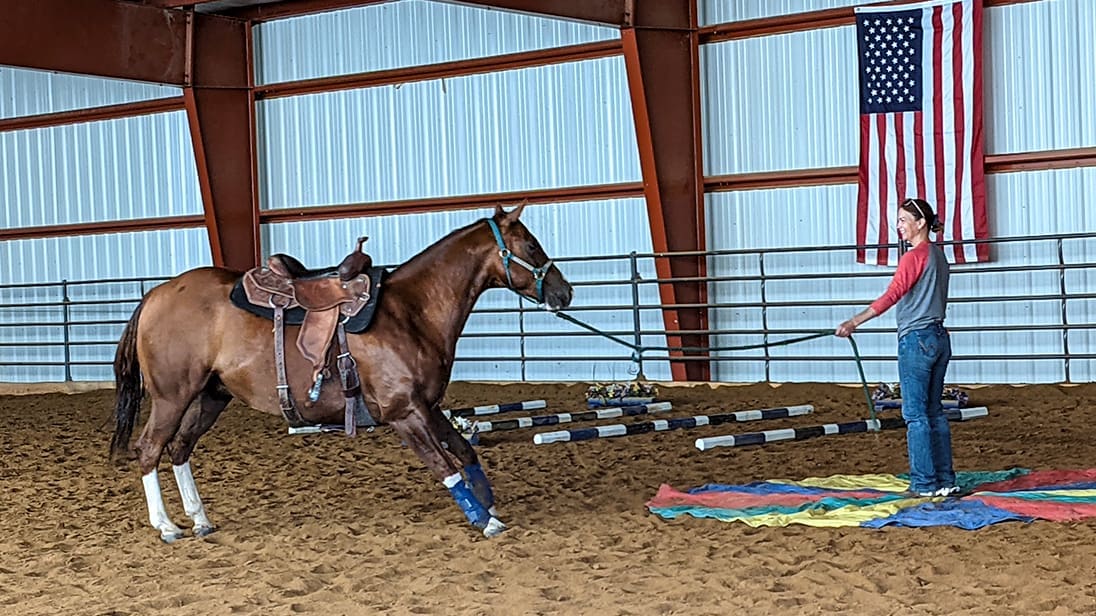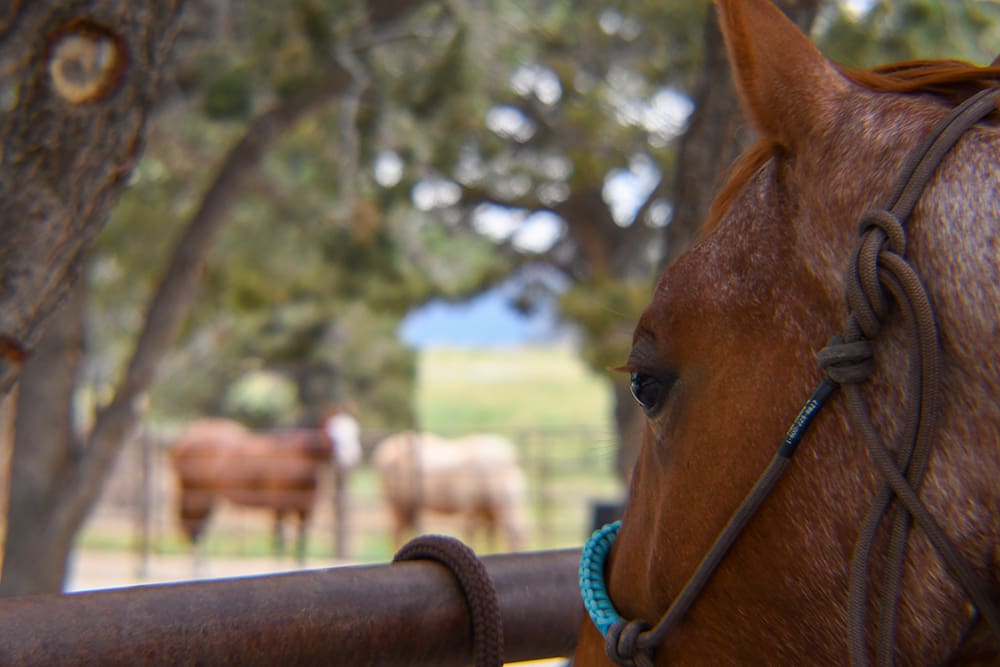My friend Nancy is a life-long rider in her 60s and a pretty good hand with a horse. One day while practicing her reining patterns in the arena, her horse spooked ‘out of the blue’ and she lost her balance and fell. Her injuries would’ve been minor for someone several decades younger. It wasn’t a terrible fall, but it was a fall and she deeply injured her psyche.
Nancy felt lots of pressure to get back to riding from a horse-loving family, and a network of friends she often rode with. But her injuries gave her deep reservations about riding–especially returning to the level she had been riding. Before long, Nancy found it easy to make excuses to skip riding. The house, the job, the husband, the grandkids, the charity work—all provided her with great excuses not to ride. When she ran out of excuses from her personal life, she started blaming her horse—“the farrier didn’t come, he seems off today, he’s got a bite on his back, I think he is depressed.”
Eventually Nancy realized her excuses for not riding actually boiled down to avoidance. And once she was avoiding her horse, she had tremendous feelings of guilt. She came to me for help and together we took a long hard look at her situation and how she got there and developed a plan for change. Nancy took control of herself and her personal journey and set about to enjoy horses on her own terms, even if it meant not going along with everyone else’s idea of what she should be doing with her horse. It was time to set her own goals and let go of the guilt.
It’s now a whole new era in her horse life and Nancy is enjoying every minute of it. She consciously chose to let go of others’ expectations about how much she should ride again or at what grand level of showing. She actually gave up showing and got into trail riding and driving minis with her grandkids. And she loves it. She has new goals and ambitions that bear no resemblance to her old ones and her friends and family are all happy for her and supportive. What a success story!
There are lots of reasons you might feel guilt when it comes to your horses—not riding as often as you should, not fostering the relationship as you should, or letting your busy life get in the way of your personal fulfillment. Do you feel guilty for not achieving some unrealistic goals you set for your horse or not doing as much as you thought you would? The initial ideas we have about riding or showing might change after having horses for a while. And that’s OK.
While guilt can eat you up from the inside out, it can be useful if it propels you to action. The great thing about guilt is when you own it, analyze it and rectify it, the oppressing emotion goes away. The sooner you get started, the better!
Own It!
Think through your guilt enough to define it, figure out where it is coming from and what you wish would change. First and foremost, who is making you feel guilty? Is it coming from inside your own head or pressure from others? It’s quite possible you are doing this to yourself.
Get specific about what makes you feel guilty—do you wish you had more time to spend with your horse, or because of promises or commitments you have made to others, because your goals have changed, or because you are making excuses for not riding due to fear issues?
These can be painful questions to answer and may require some deep introspection on your part, but until you get to the bottom of your guilt and define it, the emotion will continue to haunt you and pollute your horse life.
Analyze the Guilt
Often people feel guilty for no good reason. If it is out of your control, you shouldn’t worry about it. But sometimes people feel guilt because of an underlying conflict within you or an underlying conflict with others.
Starting into horse sports is a little like deciding what to major in at college. Sometimes you know early-on and you think you are sure that is what you want, but by the time you graduate, things look a little different. Sometimes you pick your major based on other’s expectations—your parents’, your friends’. If you’re expecting yourself to ride at a level that your spouse, your friends or your trainer chose for you, it may be time to choose your own adventure. Following someone else’s plan may work for a while, but later-on, when you have more experience, your ideals may change. That’s okay! Change is good.
Time for Change
Be realistic about what time you can dedicate to your horse and make it happen. Address the excuses you have for not riding and make a commitment to change. If your horse needs more work than you can realistically provide, find a solution. Pay a teenager to ride a couple times a week, hire a trainer, share your horse with someone or consider trading in your youngster for an older horse that needs less work.
If you found that your guilt is because you’ve been avoiding your horse due to an underlying fear, there are many things you can do to prevail. The important thing is to make a plan to build your confidence—it is a slow and steady path and requires patience. This may mean you don’t ride for a while to stay within your comfort zone long enough to build confidence. Check out my website (http://juliegoodnight.com) for more information on developing your own plan of action to overcome your fear and build confidence with horses.
If your time is short and/or you need to build more confidence before going back to riding, there are many things you can do to make your horse time more productive. Maybe you’ve only got 20 minutes of quality time with your horse—make the most of it by grooming your horse thoroughly and spending a few minutes on his ground manners.
There are many great ways to enjoy horses without riding at all. If you spent 15 minutes on groundwork every time you were with your horse, you would make tremendous progress. Basic lead-line work is excellent for developing your relationship and building your confidence and leadership skills. If your time is short, you can make a much greater impact on the relationship with your horse with groundwork, instead of rushing through a ride that neither of you enjoys.
When it comes to horses, you always need to be open to change. If you’ve analyzed your guilt and come to the conclusion that you are in the wrong discipline or that what you thought you wanted is not cutting it anymore, consider a change. It’s okay to change your goals. I’ve reinvented myself numerous times during my half a century of riding horses and each time the change has been positive and has reinvigorated my passion for horses.
Enjoy the Horse Life
I’ll never forget a comment from a clinic participant some years ago. She was a very high-level executive in a high-stress job and she was attending one of my “fear management for riders” seminars. We were talking about getting in touch with your passion and understanding your purpose when it comes to horses—this is not as easy as it sounds.
The high-powered executive admitted, somewhat reluctantly, that all she wanted to do at the end of a long hard day at work, was to get her horse out of the stall, lead him to the grass and listen to him munch grass contentedly as all her stress melted away. Turns out that was what she needed from her horse at that time in her life.
But you know what? We got into horses for personal pleasure—not to add more stress in our lives. If you have time and enjoy daily riding and working toward difficult goals—go ahead, achieve all you will! But if that isn’t your path now, that’s OK. Do what gives you the greatest satisfaction and relish it—whatever time you have. Do not pollute your mind with useless feelings of guilt or let yourself be high-jacked by what others think. The only two opinions that matter are yours and your horse’s.



